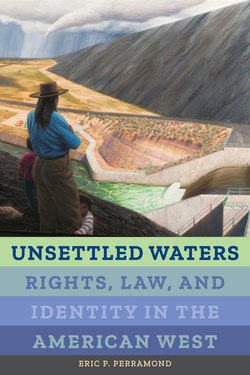Читать книгу Unsettled Waters - Eric P. Perramond - Страница 8
На сайте Литреса книга снята с продажи.
ОглавлениеPreface
“Why are you here, exactly?” Tamara asked me on a hot July day in 2011. We stood by the Rio Santa Barbara, a high-mountain New Mexican stream lined with cottonwoods and aspens, with dry meadows and juniper-dotted hills stretching beyond. Tamara had been describing her work as a mayordoma, the water ditch boss in charge of allocating the stream’s trickle to her neighbors’ fields.
By that point, four years into my research, I’d been asked this question many times, and I had the answer: “I’m here to listen and learn.”
“Well,” she said, straightening up a bit, “that’s different.”
Unsettled Waters conveys the voices and concerns of actual people caught up in the legal labyrinth of what are known as water rights adjudications. Water adjudications in the American West are often state-driven lawsuits designed to find, map, and inventory existing water-use rights. Every western state has its own distinct procedure, although many share similar templates.
For all involved in these watershed lawsuits—the irrigators, lawyers, technicians, politicians, and observers like me—adjudication is a complex, adversarial, and sometimes baffling process. Adjudication has been underway for well over a century, longer than New Mexico has been a state, and there is no end in sight. It can also seem boring, as most of the work is conveyed in legalese through administrative court documents. This is partially why the process has often been ignored.
However, as I learned from water users like Tamara, adjudication is anything but boring. Adjudication resurfaces conflicts. It delves into the intricacies of state cartographies, of multiple histories of colonialism, culture, sovereignty, and identity. The process has exposed, antagonized, and rearticulated social relationships over water that are vital to understand in an era of increasing water scarcity and competing demands.
This book is a geographic ethnography that makes use of living testimony, historical and legal archives, and on-the-ground observations from New Mexico. When I moved back to the West in 2005, I was interested in pursuing regional research that reflected my new academic appointment at Colorado College in Southwest studies and environmental science. It all started as a modest project to document how small ditches in New Mexico were coping with water scarcity. It turned into something far more complex than I had anticipated. Adjudication kept coming up in my interviews. I was curious as to what adjudications entailed, why they were taking so long, and what they meant for water users. My small summer project turned into a decade-long study that, like adjudication, still continues. Like the process itself, this book has had to account for the state’s fixation with tracking water users and prior dates of water use and the fact that the process is ongoing and still happening in the present, with an eye toward the future. After all, when New Mexico started this enterprise, the hope was that there might be water left over to allocate.
As New Mexicans made clear from the start, our collective water futures are at stake in adjudications. I listened to water experts across the spectrum, from irrigators like Tamara to the attorneys and state experts who conduct the process. Unsettled Waters is a book for all who care about the future of water, the ways in which states allocate and manage water, and the effects of these largely unseen legal proceedings on water users.
